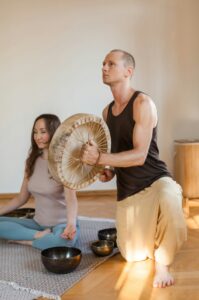Balanced Being: Luis Chanaga’s Insights into Yoga and Flexible Living


Yoga is more than just a physical discipline; it is a rich tradition rooted in ancient India, designed to enhance the unity of body, mind, and spirit. Through a blend of postures, breathing exercises, and meditation, yoga, and flexible living promotes a holistic approach to health that has stood the test of time. Today, it is embraced globally for improving flexibility, strengthening mental focus, and elevating spiritual wellbeing.
Building Flexibility through Asanas
Yoga’s physical component centers around asanas, or poses, crafted to stretch, strengthen, and balance the body. These poses vary in complexity and intensity, each targeting different muscle groups. Regularly engaging in these asanas can lead to excellent muscle elasticity and joint mobility, which are vital for maintaining an active and healthy lifestyle. Poses like the ‘Forward Bend’ or ‘Plow Pose’ are particularly effective in enhancing the flexibility of the spine and legs.
Pranayama: The Art of Breath Control
Breath control, or pranayama, is essential for mastering the asanas and deepening meditation in yoga. Pranayama techniques involve regulating breath to control the body’s energy flow or prana. This control is believed to improve respiratory efficiency, calm the nervous system, and stabilize the mind, making it easier to achieve a meditative state and maintain physical endurance during yoga.
Enhancing Mental Agility and Emotional Health
Yoga offers profound psychological benefits, including improved mental flexibility. Regular practice helps individuals develop a mindfulness that nurtures mental clarity, reduces stress, and enhances emotional resilience. This mindful approach allows practitioners to manage anxiety and depression and fosters a greater sense of peace and contentment in daily life.
Deepening Practices for Advanced Flexibility
For those seeking to deepen their yoga practice, more advanced and physically demanding yoga styles can offer a pathway to enhanced flexibility and strength. Practices like Hot Yoga or Power Yoga introduce a vigorous routine that challenges the body and helps build significant muscle strength and flexibility over time.
Integrating Yoga into Everyday Activities
Making yoga a part of daily life can significantly enhance its health benefits. Simple activities, such as starting the day with a few stretches or doing a series of poses after work, can help maintain flexibility, lower stress levels, and uplift mood. Regular practice contributes significantly to overall wellbeing and physical health, even in short sessions.
The Role of Community in Yoga
Yoga is often practiced in the community, which can be a powerful motivator. Participating in group yoga sessions at a local studio or joining a yoga retreat can provide support and deepen one’s commitment to the practice. Community interactions offer a chance to share experiences and insights, enriching the personal journey in yoga.
Yoga for Diverse Needs
The versatility of yoga makes it accessible for everyone, irrespective of their age or health status. Tailored classes like chair yoga for older adults or yoga therapies for specific health issues allow everyone to enjoy the benefits of yoga. This adaptability ensures that yoga remains inclusive and relevant across different lifestyles and cultures.
Continued Learning in Yoga and Flexible Living
Yoga and Flexible Living is a lifelong journey of learning and personal growth. Many practitioners continually seek to deepen their understanding and skills through workshops, specialized training, and retreats. This ongoing education enriches their practice and helps spread the knowledge and benefits of yoga to others.
Yoga is a comprehensive system for enhancing physical, mental, and emotional health. Its practice adapts to individual needs and evolves with continuous learning, allowing everyone to achieve excellent balance and mobility.
